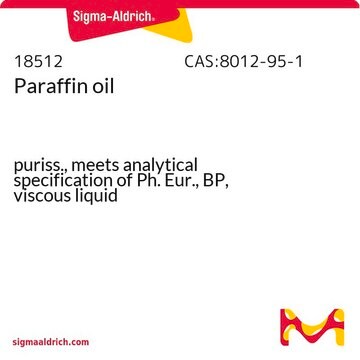P6617
Pristanic acid
≥97% (GC), ethanol solution
Sinónimos:
2,6,10,14-Tetramethylpentadecanoic acid
About This Item
Productos recomendados
Nombre del producto
Pristanic acid solution, mixture of isomers, ethanol solution, ≥97% (GC)
Quality Level
assay
≥97% (GC)
form
ethanol solution
storage temp.
−20°C
SMILES string
CC(C)CCCC(C)CCCC(C)CCCC(C)C(O)=O
InChI
1S/C19H38O2/c1-15(2)9-6-10-16(3)11-7-12-17(4)13-8-14-18(5)19(20)21/h15-18H,6-14H2,1-5H3,(H,20,21)
InChI key
PAHGJZDQXIOYTH-UHFFFAOYSA-N
Biochem/physiol Actions
signalword
Danger
hcodes
Hazard Classifications
Eye Irrit. 2 - Flam. Liq. 2
Storage Class
3 - Flammable liquids
wgk_germany
WGK 2
flash_point_f
55.4 °F
flash_point_c
13 °C
ppe
Eyeshields, Faceshields, Gloves, type ABEK (EN14387) respirator filter
Elija entre una de las versiones más recientes:
Certificados de análisis (COA)
¿No ve la versión correcta?
Si necesita una versión concreta, puede buscar un certificado específico por el número de lote.
¿Ya tiene este producto?
Encuentre la documentación para los productos que ha comprado recientemente en la Biblioteca de documentos.
Los clientes también vieron
Nuestro equipo de científicos tiene experiencia en todas las áreas de investigación: Ciencias de la vida, Ciencia de los materiales, Síntesis química, Cromatografía, Analítica y muchas otras.
Póngase en contacto con el Servicio técnico













